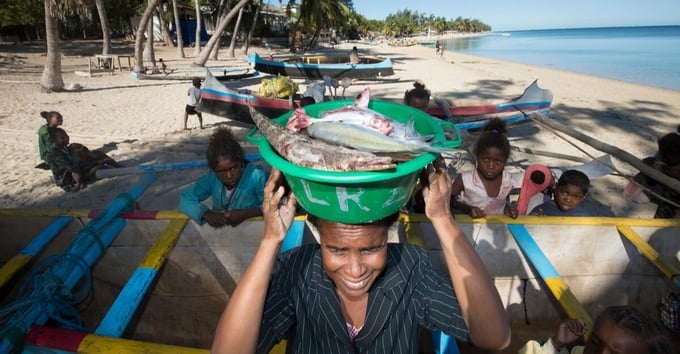June 17, 2025 | 02:56 GMT +7
June 17, 2025 | 02:56 GMT +7
Hotline: 0913.378.918
June 17, 2025 | 02:56 GMT +7
Hotline: 0913.378.918

Over 500 million people globally depend, at least partially, on fisheries for their livelihoods - nearly half of them women when considering the whole value chain.
A new global fisheries management body began its inaugural meeting today with key items on the agenda including best practices and approaches for the effective management of fisheries resources, and improvements in the Food and Agriculture Organization of the United Nations (FAO) methodology to estimate the state and health of the world's marine fish stocks.
The fight against Illegal, Unreported and Unregulated (IUU) fishing, the promotion of adaptive responses to the climate crisis, and mainstreaming biodiversity will also be on the agenda of the COFI Sub-Committee on Fisheries Management's 15-18 January 2024 meeting, with a specific focus on small-scale fisheries.
Over 500 million people globally depend, at least partially, on fisheries for their livelihoods - nearly half of them women when considering the whole value chain. While 65 percent of fish stocks were within biological sustainable levels, 35 percent were estimated to be at unsustainable levels - a proportion that has been increasing since the 1970s.
The COFI Sub-Committee on Fisheries Management’s main functions are to provide technical and policy guidance on fisheries management,identify global challenges and opportunities, and promote collective solutions to ensure the environmental, economic and social sustainability of a sector that is crucial for global food security and nutrition.
“Improving global fisheries management remains crucial to restore ecosystems to a healthy and productive state and to protect the long-term supply of aquatic foods,” said FAO Director-General QU Dongyu in his address to the opening of the meeting’s virtual plenary session. “This improvement also includes eliminating illegal, unreported, and unregulated fishing and on addressing the impacts of the climate crisis, and biodiversity degradation that are also heavily impacting aquatic and coastal ecosystems and dependent communities”.
Qu underscored that the Sub-Committee on Fisheries Management will play an important role in addressing these global and complex issues. It will identify and discuss major trends and issues in fisheries management that require measures and make recommendations to the Committee on Fisheries to help advance implementation of the FAO Code of Conduct for Responsible Fisheries and achieve the vision set out in FAO’s Strategic Framework 2022-31 for better production, better nutrition, a better environment and a better life, leaving no one behind.
The Director-General noted that the Sub-Committee on Fisheries Management will guide FAO’s Blue Transformation roadmap and its core objective of ensuring that global fisheries resources – including in lakes, rivers and seas - are efficiently and effectively managed.
On the agenda
During this week’s meeting, Members will share insights, experiences and effective strategies to enhance fisheries management, explicitly considering ecological, social, economic, nutritional and gender objectives. The discussion will be particularly geared towards improving practices in small-scale fisheries both inland and marine, fostering a holistic approach to sustainable management.
Members will also discuss ways to assess the magnitude and impact of illegal, unreported and unregulated (IUU) fishing. This includes reviewing monitoring, control and surveillance systems, as well as enforcement requirements, and improving compliance with international conservation and management measures.
FAO has undertaken various activities to support Members in transitioning to climate resilient fisheries management, and this issue is to feature during the session. The Sub-Committee is expected to share lessons learned towards integrating climate change into national and multilateral fisheries management and governance and recommend areas that need further development, including increasing the adaptive capacity of fisheries operations and assets.
The importance of integrating biodiversity considerations in fisheries management within the context of the Kunming-Montreal Global Biodiversity Framework of the Convention on Biological Diversity is also on the agenda.
Better statistics on the horizon
During the session, Members will review methodological updates to FAO’s State of Stocks Index (SoSI), which has been published every two years since 1971 and presented in FAO’s flagship The State of World Fisheries and Aquaculture (SOFIA) report since 1997.
FAO is the only organization mandated to collect such statistics worldwide. The proposed updates aim to enhance transparency, geographical coverage, and measurement accuracy to better reflect changes in dominant species, stocks and fisheries practices and align with reporting initiatives and requirements.
COFI, a Technical Committee of FAO,, is the only global inter-governmental forum where major international fisheries and aquaculture problems and issues are examined and recommendations addressed to governments, regional fishery bodies, NGOs, fish workers, FAO Members and the international community.
COFI already has two other sub-committees: one on aquaculture and another on the fish trade. With the creation of the Sub-Committee on Fisheries Management, there is now a third sub-committee entirely dedicated to sustainable fisheries management.
(FAO)

(VAN) Extensive licensing requirements raise concerns about intellectual property theft.

(VAN) As of Friday, a salmonella outbreak linked to a California egg producer had sickened at least 79 people. Of the infected people, 21 hospitalizations were reported, U.S. health officials said.

(VAN) With the war ongoing, many Ukrainian farmers and rural farming families face limited access to their land due to mines and lack the financial resources to purchase needed agricultural inputs.

(VAN) Vikas Rambal has quietly built a $5 billion business empire in manufacturing, property and solar, and catapulted onto the Rich List.

(VAN) Available cropland now at less than five percent, according to latest geospatial assessment from FAO and UNOSAT.

(VAN) Alt Carbon has raised $12 million in a seed round as it plans to scale its carbon dioxide removal work in the South Asian nation.

(VAN) Attempts to bring down the price of the Japanese staple have had little effect amid a cost-of-living crisis.